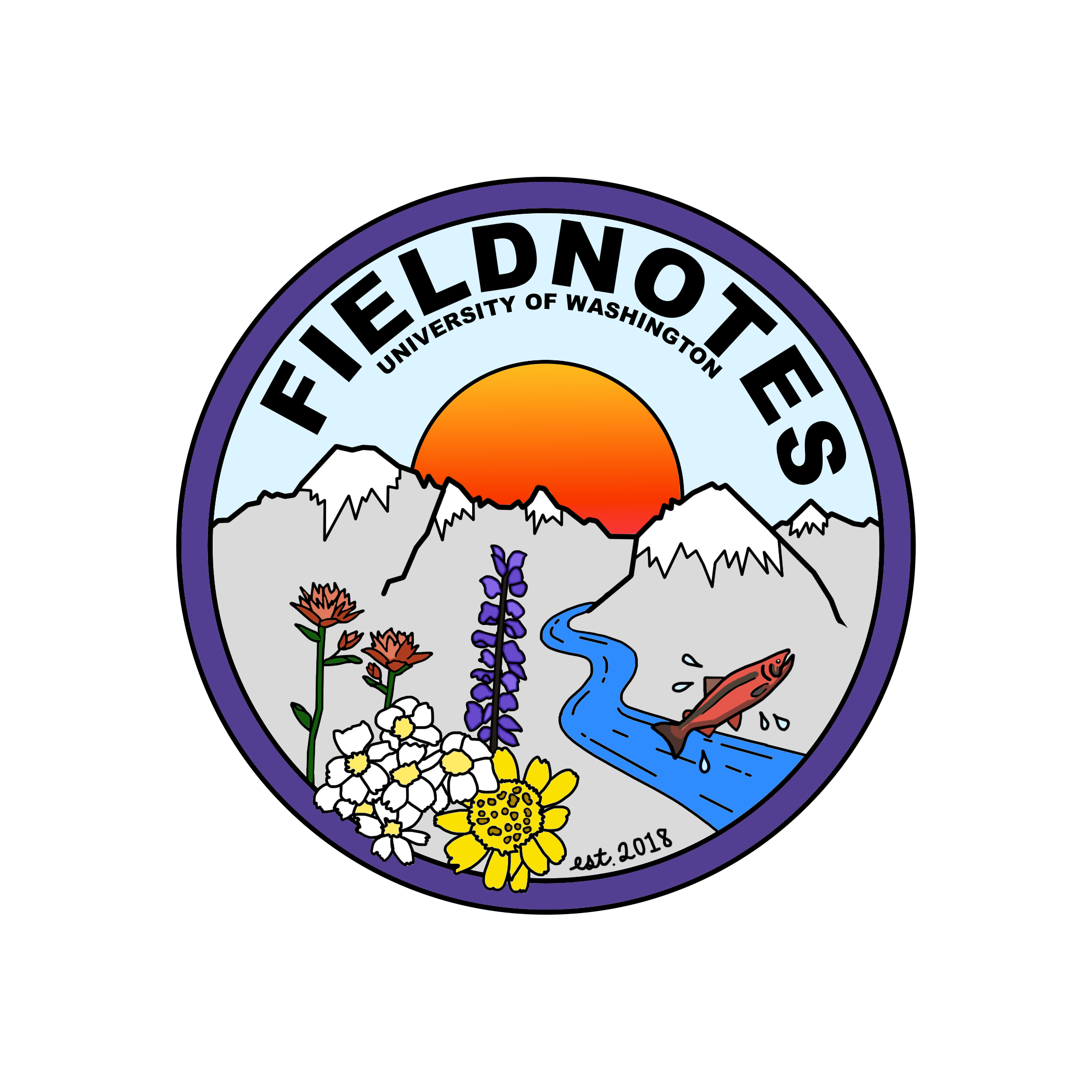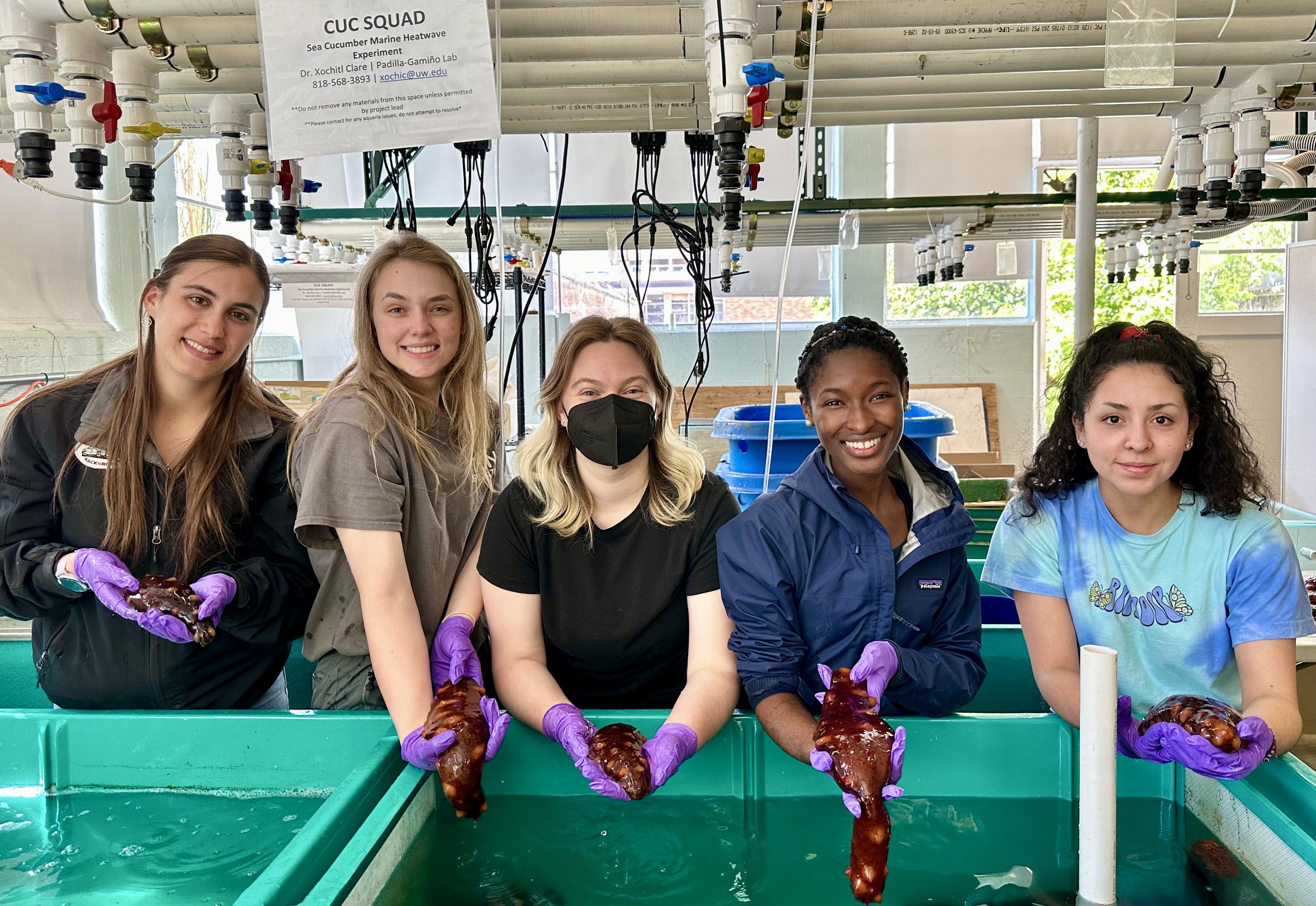Connecting Over Sea Cucumbers: The Cuc Squad’s Holistic Science Education Program
By Anouk Janess and Xochitl Clare
Members of the Cuc Squad posing with specimens of Giant sea cucumber. Left to right: Alexis Twing, Charli Henline, El Califf , Dr. Xochitl Clare, April Morrow (Image credit: Alex Ta Rian).
If you are an undergraduate STEM student, you know the stress of trying to find research mentorship in your study area. Hands-on lab experience is vital for undergraduate students who hope to build careers in STEM, yet research projects often have a variable forecast of need for undergraduate help which doesn’t align very well with students’ strict coursework schedule. Furthermore, mentorship is typically practiced one-on-one between a single undergraduate and researcher which siphons peers away from each other and the opportunity to build relationships amongst themselves. With enormous pressure on undergraduates to learn the practical skills needed for success in their field, it is no surprise this hierarchical structure fosters a competitive and exclusionary culture.
“The Cuc Squad Initiative” is an undergraduate pilot program that aims to change restrictive and hierarchical practices in undergraduate lab mentorship. In the Cuc Squad, 15 undergraduates came together in team-oriented research on the spawning behaviour of the giant California sea cucumber (Apostichopus californicus). Spearheaded and led UW SAFS postdoctoral researcher Dr. Xochitl Clare in the Padilla-Gamiño Lab, the program aimed to facilitate student autonomy, leadership, and peer connection. Over the course of two months, Clare guided the Cuc Squad students in rearing sea cucumbers to examine their tolerance to rising temperatures and aid small-scale hatcheries towards sustainable harvesting solutions.
Clare’s interdisciplinary training as both a Performing Artist and Marine Biologist informed the design of Cuc Squad. Her artistic influence was felt from the beginning of the program where students were assigned “roles,” “call-times,” and given “run-of-show” schedules. “Take five! Don’t think about or work on anything sea cucumber related for the next five minutes,” was heard throughout the hallways of the Portage Bay Building during the time-sensitive spawning phase of the experiment.
Marine ecology often involves early rises and odd hours to study life's natural cycles. But Cuc Squad’s principles of holistic education challenged traditional research methods which sometimes prioritize data extraction over health and wellness. Clare was transparent with the team on this scheduling dilemma when chances of spawning seemed slim. “Being a traditionally trained ecologist myself, I really had to sit with myself and think: What is the advantage to having our students arrive at 5am to work on this?” She explained that working on the animals’ schedule is sometimes necessary but should be done sparingly with proper breaks and wellness checks. This open dialogue about care and wellbeing practices in STEM validated the students’ efforts and gave them time to decompress from intensive lab sessions.
April Morrow and Dr. Xochitl Clare discussing tactics over the sea cucumber tank (Image credit: Anouk Janess).
“There was a lot of uncertainty which made it really interesting and a lot to learn as the project progressed,” commented April, a third-year student, about the process of spawning an understudied, elusive fishery species.
Large research projects must also balance the timeline of lab work with science communication and field trips. Cuc Squad students were encouraged to choose their role and get involved in the broader network of Cuc Squad to see how the pieces of a large project like this fit together. At the close of the project students crafted research presentations, connected with project partners (Washington Department of Fish and Wildlife, Wildcatch Seafood Products), and took a field trip to the Puget Sound Restoration Fund to share their findings on aquaculture best practices. These experiences aided the students’ understanding of how applied science is braided with outreach and community engagement, and how local research can respond to global challenges like climate change. Megan, a third-year student, appreciated the project’s expansive connections. “Since marine science is closely tied to the livelihood of millions of people around the world, it's important to participate in scientific work through an interdisciplinary lens [...] and conduct research in the broader knowledge of how it impacts people.”
The next generation of climate change responders must work together locally to address global challenges. “The Cuc Squad Initiative” is an exciting development in STEM education that empowers early-career scientists to collaborate and embrace an interdisciplinary approach to research. Science education programs like Cuc Squad which promote leadership and the cultivation of diverse skill sets are vital to our global climate change mitigation success.


